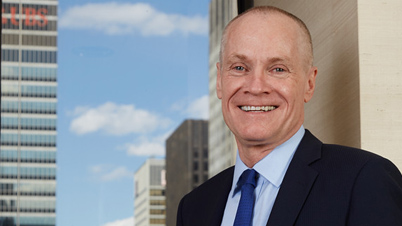
Fox’s Abernethy: Get Rid Of Any Station Cap

With the FCC contemplating setting a new ownership cap for TV stations, Fox Television Stations CEO Jack Abernethy today made the case for no cap and criticized other broadcasters who want to maintain a cap of some kind out of their own “self interest.”
“The best thing for our business would be full relaxation of ownership restrictions,” he said in accepting Broadcasting & Cable’s Broadcaster of the Year Award at the TVB Forward Conference.
What’s more, he said, it is also the best thing for employees and consumers. “Arguments to the contrary are defensive, self-serving, misinformed or a combination thereof.
“Only with size and scale can we have a chance to deal with the many challenges we face against competitors with no such restrictions.”
Scale will accelerate needed progress in audience measurement and targeting, automation and in the rollout of the new ATSC 3.0 broadcast standard. “Only with a few well-funded players can these get the clarity they require.”
He rejected the argument that industry consolidation will lead to less news competition and diversity. “That is ridiculous; just the opposite is true.”
As Fox has added stations, he said, it has expanded news and become increasing competitive in its markets. “When we added the San Francisco station in October of 2014, they were doing eight hours per day of local news. Now they are doing 12 — all of them No. 1. At nighttime, when most stations do one half hour, most of our stations do 90 minutes or more.”
Abernethy said that Fox’s size also allows the group to try different formats with diverse talent. He cited The Isaiah Factor Uncensored in Houston, The Jason Show in Minneapolis, The Q in Philadelphia, Free 4 Al lin Dallas and Like It or Not in Washington.
Abernethy’s comments come as the FCC is weighing relaxing or eliminating the cap, which now restricts groups to roughly between 50% and 78% of TV homes depending on each group’s particular mix of VHF and UHF stations. The cap varies by group because, in calculating reach, the FCC discounts UHF coverage by half.
Abernethy chided other broadcasters that are not rallying around the no-cap option. “Each of us is reflecting a near-term view of what’s in the best interest of our equity holders,” he said. “So, it’s, ‘I like where I am so let’s keep things as they are, or I should be able to get bigger but not you. Or, let’s not let an affiliate group get too large, or everyone can grow except for the O&O groups.’
They argue for caps at different levels — 39%, 50%, 78%. “Discount, No Discount. All arbitrary. All driven by self-interest.”
Abernethy also shared his view of what makes a broadcaster — integrity, accuracy and community service.
“[A] broadcaster guards his/her reputation and values it. With billions of dollars transacted essentially without contracts, the broadcaster knows that their word must be good because the client will be back during the next cycle.
“The broadcaster also understands that they have an obligation to their community, both in covering the day-to-day operations and, of course, during emergencies and disasters like the unfortunate one we just had in North Carolina.
“Thirdly … accuracy is everything. There are no compromises — in reporting the news, in billing. What we promise to advertisers, we deliver. No blaming algorithms or ad ops or the IT guy or just plain ignoring it. We stand accountable to our clients and we will take that obligation to any and all platforms we occupy in the future.”
































Comments (0)